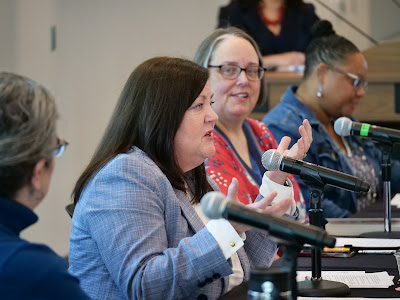 |
| Executive Director of Development Nancy Michalko talks to UWHEN audience about trust |
At their annual President’s Luncheon, nearly 80 participants from the SLCC chapter of Utah Women in Higher Education Network or UWHEN heard from Salt Lake Community College President Deneece G. Huftalin about the origins of the organization at SLCC. Early on in her presidency, President Huftalin accepted a challenge to make the advancement of women at SLCC a priority. The SLCC chapter of Utah Women in Higher Education Network, or UWHEN, “is a product of that challenge,” said Huftalin.
Huftalin said her goal in helping to bring UWHEN to SLCC was to provide a place in which women could thrive. She said UWHEN is a place for women to get resources and provides an “opportunity for networking and engagement.”
The UWHEN chapter provides several professional development and networking opportunities throughout the year. The annual President’s Luncheon typically focuses in on a single topic and features President Huftalin. This year President Huftalin and UWHEN’s Board of Directors decided on the topic of trust and invited four women in senior leadership positions from various departments to participate in a panel discussion.
Chapter President Trina Polta said the purpose of the discussion was to provide a “safe space among those in attendance to foster an open conversation that would lead to personal and professional discoveries.”
Rachel Lewis, assistant provost for Curriculum & Academic Systems, started off the discussion describing trust as “a place where I can be me and you can be you.” Building on that theme, she added, “We are hardest on ourselves,” but that learning to “trust yourself leads to feelings of competence and confidence.”
Nancy R. Michalko, executive director of Development said, “Trust is the number one competency in leadership work today." She spoke about how we can create more trust in society by learning to trust ourselves first and then building trust within our own circles of influence and expanding that out.
Co-Interim Associate Vice President for Student Success, Candida Darling spoke about her experience with trust and the importance of accountability partners. She said that having accountability partners helps to keep her grounded. In her call to action, she said, “trust must be nurtured.” Darling challenged participants to intentionally seek out people to include in their circles of trust. “We are stronger together,” she said.
Gina Alfred, staff association president said that building trust takes putting people first. “Check in with people first from an emotional perspective and then move on to policy second.” She talked about how people just want to be validated in their experiences. Alfred encouraged participants to create trust by “embracing the differences and building on the commonalities.”
President Huftalin wrapped up the session by asking participants to think of one word to describe a person that they trust most. She then challenged participants to think about what they could do to emulate that behavior.

Comments
Post a Comment